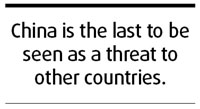US defense report once again fails to convince
By Shen Dingli (China Daily)
Updated: 2008-03-18 07:25
Updated: 2008-03-18 07:25
The US Department of Defense recently published yet another report on China's military capabilities. The US military has been publishing these reports every year since 2000.
It seems these kinds of assessment reports have not been able to effectively boost propaganda about China's military threat as its authors hoped, at least not as fully effective as intended.
The report was read and commented on by all relevant departments of the US government before its release, therefore it reflects a certain consensus among those administrative offices, including the omission of some paragraphs pedaling the China threat theory.
The report was written by the Pentagon, at the request of Congress, an annual US version of the "China Defense Whitepaper" by a specialist team of the US administration.
However, those US lawmakers totally sold on the China military threat theory never wait till the report is published to start criticizing China.

None of those members of the US Congress are known to have ever read such reports carefully or change their views afterward. We have never seen any US Congress member come out and slam China for posing a military threat every time a report like this is published, because the "facts" listed in such reports convince people that China is not a threat.
For instance, the latest report puts China's armed forces last year at about 3 million, including the armed police, and the defense budget between $97 billion and $140 billion (China's official figure is $45 billion).
China's military personnel more than double America's, while its defense spending is less than one-fifth of the US (the US defense spending and cost of the war on terror amounted to $710 billion last year), and only 10 percent in per capita terms.
Is this saying China is not strong enough to be a threat or what? People should not let the US report's title mislead them. They should read the details.
From the perspective of military modernization, the US report on China's military capabilities again describes in detail the new weapons and equipment the country is developing.
If developing military hardware constitutes a threat, the US has done more than any other country in the world. Does that mean the US is the greatest threat in the world?
Some of China's armed forces are still semi-motorized and barely starting to adopt information-centric warfare capabilities, which is why the country is not spending a lot these days.
If we want to match the US in information warfare, even quadrupling the 2007 defense budget will not be enough. According to China's calculation, the US and Britain spend much more than China on defense. Even Japan, with its population and territory dwarfed by China's, used to have a bigger defense budget for decades.
Both China and Russia are dealing with attempts to divide their territories. Is the US threatened the same way?
China has never supported or provided arms to those seeking independence in Texas or Hawaii, but the US has been selling arms to Taiwan, which it recognizes as part of China's territory.
The US report on China's military capabilities says China is developing capabilities aimed specifically at thwarting attempts at "Taiwan independence" and whatever foreign help the island is receiving toward that criminal end, but in no way proves China is a threat.
China has every right to protect its own interests and no other country can deny it. As for developing its space security capabilities, China was in fact forced onto that path by the US, which turned a deaf ear to years of objection from China against the militarization of outer space. We were forced to develop such capabilities, for self-defense rather than threatening others.
When it comes to intent, China is the last to be seen as a threat to other countries.
For one thing, we never invaded Iraq or bombed Yugoslavia. On the nuclear issues of the Democratic People's Republic of Korea and Iran, China has consistently pushed for dialogue, and cared about their concerns and needs for security and development. We never rejected dialogue or stabbing the other in the back. But of course one will not find these facts mentioned in the US report.
The authors of the report would not say they know China is nowhere near being a threat as far as its capabilities and intent are concerned, but that does not mean they really do not know better.
It is exactly because they know only too well that China lacks the long-range projection ability needed for fast overseas deployment, the report ends up emphasizing China's defense development will soon exceed the requirement for national defense instead of how we are doing it.
Now why does this sound like stating that China can only be allowed to defend its coastal waters?
The reality is the need to protect our shipping fleets is mounting as the country's economy and foreign trade grows. China's maritime security is at increasing risk as globalization pumps up the country's foreign trade, further highlighting the importance of protecting our legitimate maritime interests.
This is an issue every developing major power has to resolve sooner or later, which means China must develop its long-haul escort capabilities for the growing commercial fleets as the country's economy surges ahead.
Since the US says it wants answers, we might as well tell it this: the US claims its globe-sailing navy is for world peace. If that is a good thing, then other countries should do it, too.
The author is director of the Center for American Studies with the Shanghai-based Fudan University
(China Daily 03/18/2008 page9)
|
|
|
|